Importance of Employee Relations and Employment Laws in Human Resource Management
VerifiedAdded on 2023/01/12
|12
|4870
|58
AI Summary
This report discusses the importance of employee relations and various employment laws in human resource management. It explores the value of employee relations in increasing harmony, reducing conflicts, and minimizing absenteeism. It also highlights the employment laws in the UK, such as the Equality Act 2010 and the Health and Safety Act, that businesses like Tesco need to follow. The report further examines the rights and duties of employees and employers, as well as the concept of a physiological contract. Additionally, it analyzes the impact of employee relations on stakeholders, including suppliers, customers, employees, and shareholders.
Contribute Materials
Your contribution can guide someone’s learning journey. Share your
documents today.
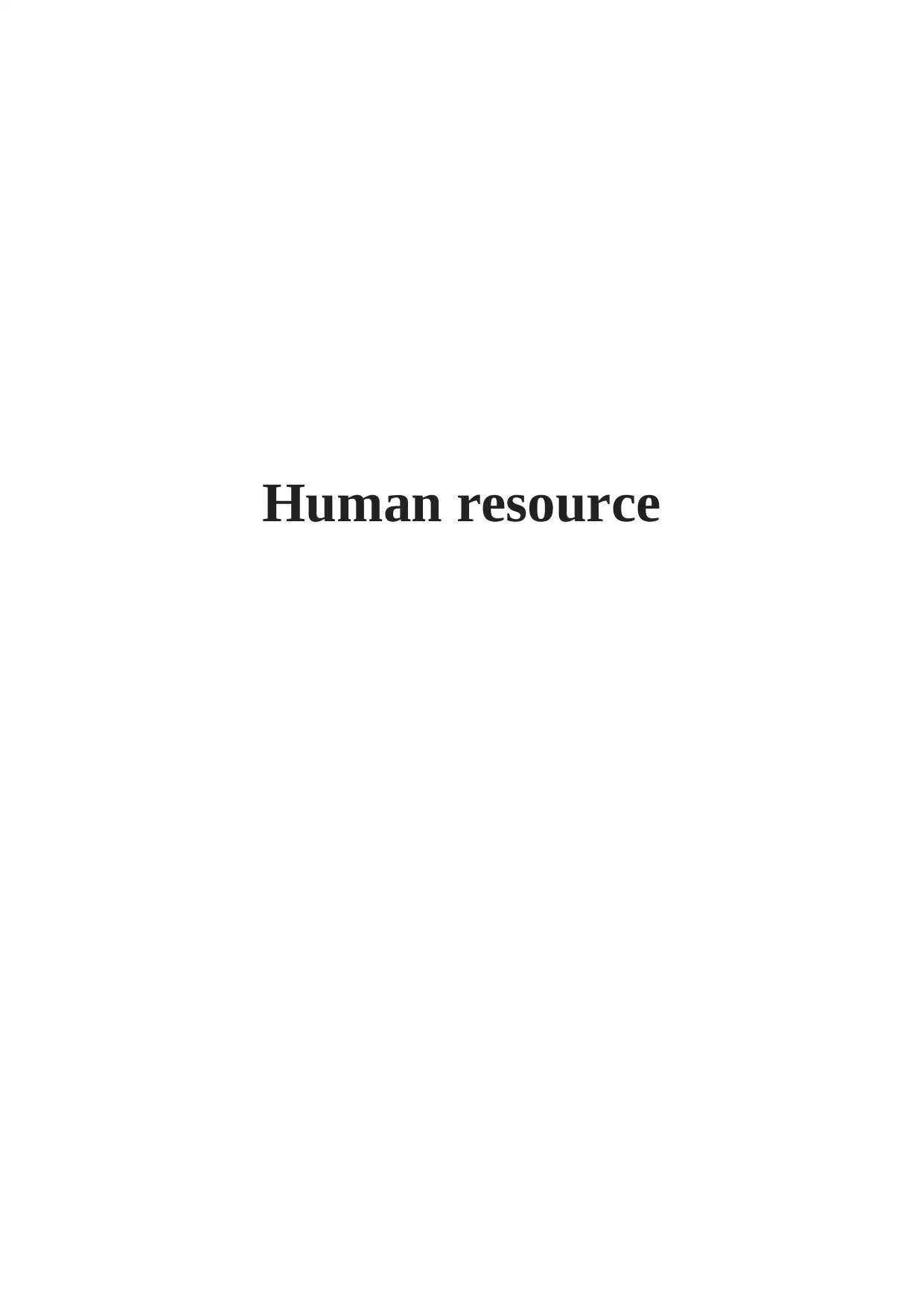
Human resource
Secure Best Marks with AI Grader
Need help grading? Try our AI Grader for instant feedback on your assignments.
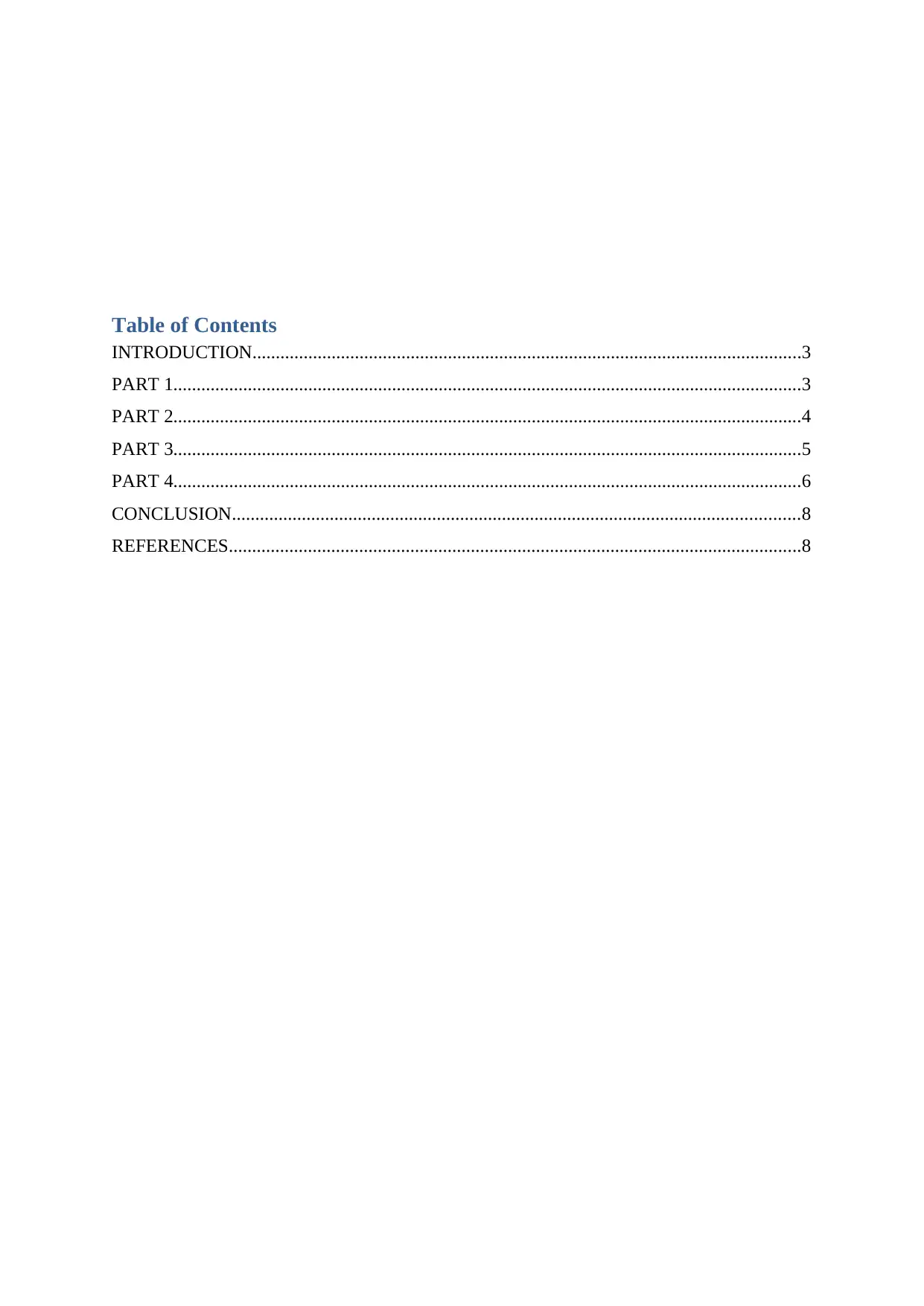
Table of Contents
INTRODUCTION......................................................................................................................3
PART 1.......................................................................................................................................3
PART 2.......................................................................................................................................4
PART 3.......................................................................................................................................5
PART 4.......................................................................................................................................6
CONCLUSION..........................................................................................................................8
REFERENCES...........................................................................................................................8
INTRODUCTION......................................................................................................................3
PART 1.......................................................................................................................................3
PART 2.......................................................................................................................................4
PART 3.......................................................................................................................................5
PART 4.......................................................................................................................................6
CONCLUSION..........................................................................................................................8
REFERENCES...........................................................................................................................8
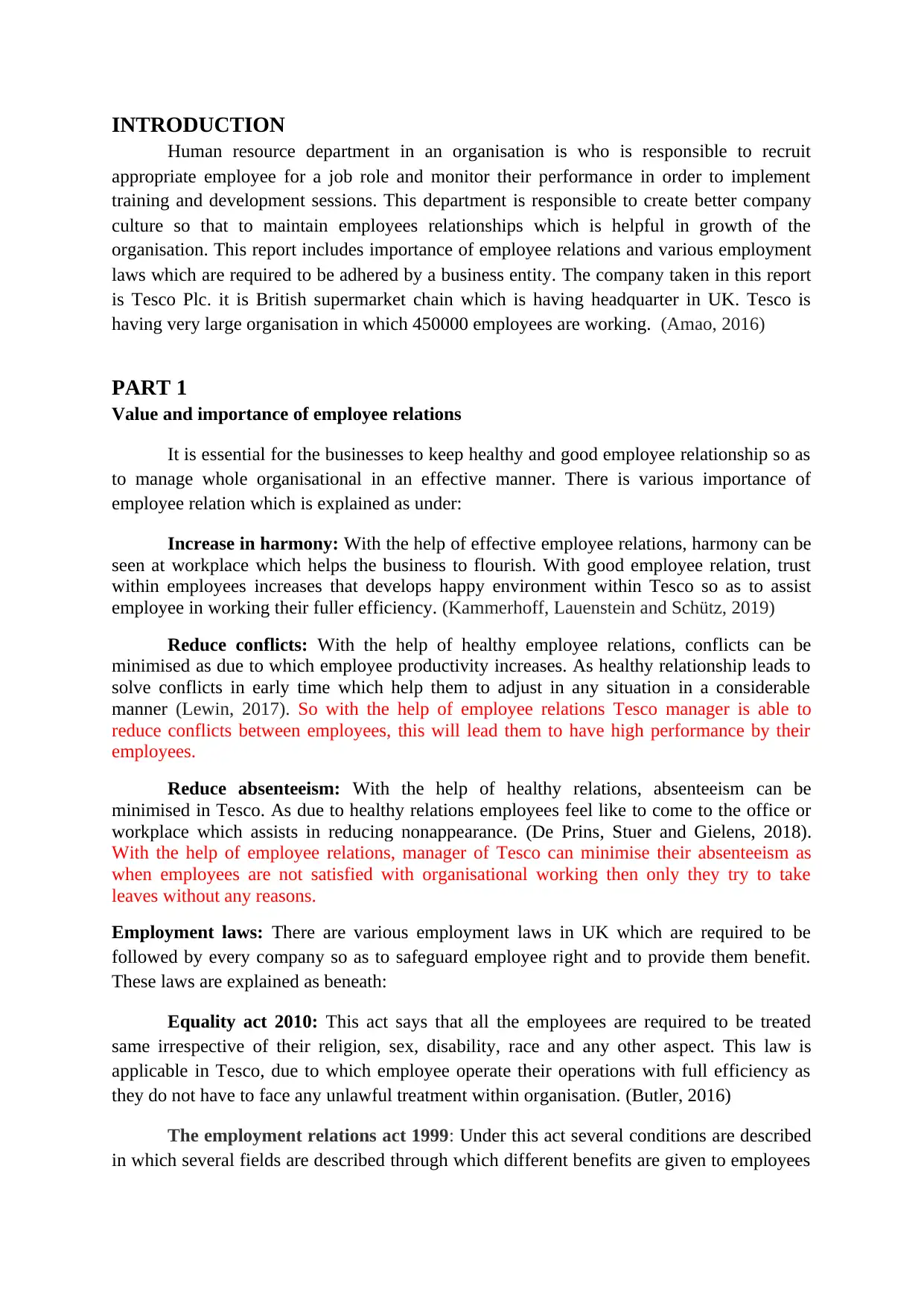
INTRODUCTION
Human resource department in an organisation is who is responsible to recruit
appropriate employee for a job role and monitor their performance in order to implement
training and development sessions. This department is responsible to create better company
culture so that to maintain employees relationships which is helpful in growth of the
organisation. This report includes importance of employee relations and various employment
laws which are required to be adhered by a business entity. The company taken in this report
is Tesco Plc. it is British supermarket chain which is having headquarter in UK. Tesco is
having very large organisation in which 450000 employees are working. (Amao, 2016)
PART 1
Value and importance of employee relations
It is essential for the businesses to keep healthy and good employee relationship so as
to manage whole organisational in an effective manner. There is various importance of
employee relation which is explained as under:
Increase in harmony: With the help of effective employee relations, harmony can be
seen at workplace which helps the business to flourish. With good employee relation, trust
within employees increases that develops happy environment within Tesco so as to assist
employee in working their fuller efficiency. (Kammerhoff, Lauenstein and Schütz, 2019)
Reduce conflicts: With the help of healthy employee relations, conflicts can be
minimised as due to which employee productivity increases. As healthy relationship leads to
solve conflicts in early time which help them to adjust in any situation in a considerable
manner (Lewin, 2017). So with the help of employee relations Tesco manager is able to
reduce conflicts between employees, this will lead them to have high performance by their
employees.
Reduce absenteeism: With the help of healthy relations, absenteeism can be
minimised in Tesco. As due to healthy relations employees feel like to come to the office or
workplace which assists in reducing nonappearance. (De Prins, Stuer and Gielens, 2018).
With the help of employee relations, manager of Tesco can minimise their absenteeism as
when employees are not satisfied with organisational working then only they try to take
leaves without any reasons.
Employment laws: There are various employment laws in UK which are required to be
followed by every company so as to safeguard employee right and to provide them benefit.
These laws are explained as beneath:
Equality act 2010: This act says that all the employees are required to be treated
same irrespective of their religion, sex, disability, race and any other aspect. This law is
applicable in Tesco, due to which employee operate their operations with full efficiency as
they do not have to face any unlawful treatment within organisation. (Butler, 2016)
The employment relations act 1999: Under this act several conditions are described
in which several fields are described through which different benefits are given to employees
Human resource department in an organisation is who is responsible to recruit
appropriate employee for a job role and monitor their performance in order to implement
training and development sessions. This department is responsible to create better company
culture so that to maintain employees relationships which is helpful in growth of the
organisation. This report includes importance of employee relations and various employment
laws which are required to be adhered by a business entity. The company taken in this report
is Tesco Plc. it is British supermarket chain which is having headquarter in UK. Tesco is
having very large organisation in which 450000 employees are working. (Amao, 2016)
PART 1
Value and importance of employee relations
It is essential for the businesses to keep healthy and good employee relationship so as
to manage whole organisational in an effective manner. There is various importance of
employee relation which is explained as under:
Increase in harmony: With the help of effective employee relations, harmony can be
seen at workplace which helps the business to flourish. With good employee relation, trust
within employees increases that develops happy environment within Tesco so as to assist
employee in working their fuller efficiency. (Kammerhoff, Lauenstein and Schütz, 2019)
Reduce conflicts: With the help of healthy employee relations, conflicts can be
minimised as due to which employee productivity increases. As healthy relationship leads to
solve conflicts in early time which help them to adjust in any situation in a considerable
manner (Lewin, 2017). So with the help of employee relations Tesco manager is able to
reduce conflicts between employees, this will lead them to have high performance by their
employees.
Reduce absenteeism: With the help of healthy relations, absenteeism can be
minimised in Tesco. As due to healthy relations employees feel like to come to the office or
workplace which assists in reducing nonappearance. (De Prins, Stuer and Gielens, 2018).
With the help of employee relations, manager of Tesco can minimise their absenteeism as
when employees are not satisfied with organisational working then only they try to take
leaves without any reasons.
Employment laws: There are various employment laws in UK which are required to be
followed by every company so as to safeguard employee right and to provide them benefit.
These laws are explained as beneath:
Equality act 2010: This act says that all the employees are required to be treated
same irrespective of their religion, sex, disability, race and any other aspect. This law is
applicable in Tesco, due to which employee operate their operations with full efficiency as
they do not have to face any unlawful treatment within organisation. (Butler, 2016)
The employment relations act 1999: Under this act several conditions are described
in which several fields are described through which different benefits are given to employees
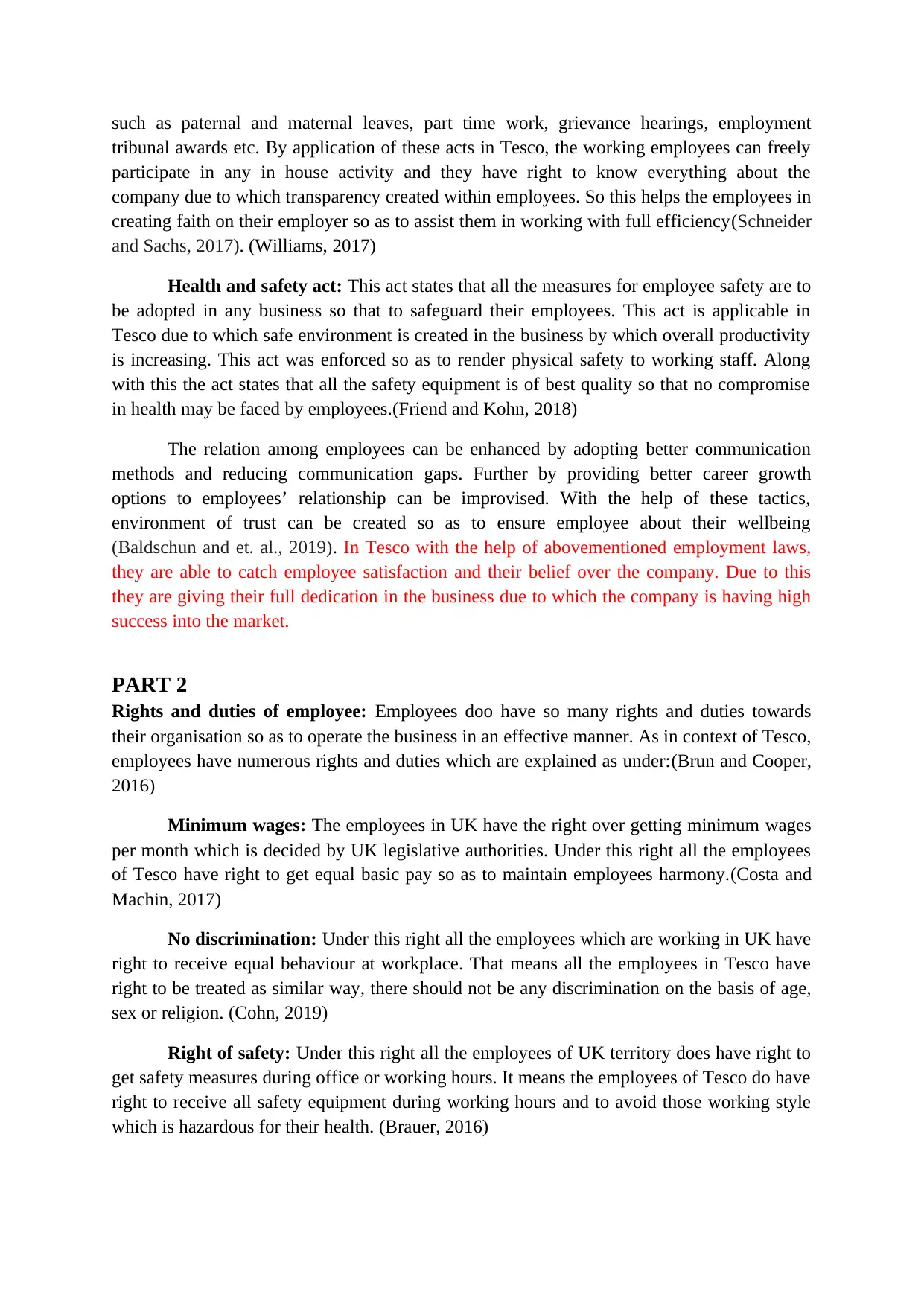
such as paternal and maternal leaves, part time work, grievance hearings, employment
tribunal awards etc. By application of these acts in Tesco, the working employees can freely
participate in any in house activity and they have right to know everything about the
company due to which transparency created within employees. So this helps the employees in
creating faith on their employer so as to assist them in working with full efficiency(Schneider
and Sachs, 2017). (Williams, 2017)
Health and safety act: This act states that all the measures for employee safety are to
be adopted in any business so that to safeguard their employees. This act is applicable in
Tesco due to which safe environment is created in the business by which overall productivity
is increasing. This act was enforced so as to render physical safety to working staff. Along
with this the act states that all the safety equipment is of best quality so that no compromise
in health may be faced by employees.(Friend and Kohn, 2018)
The relation among employees can be enhanced by adopting better communication
methods and reducing communication gaps. Further by providing better career growth
options to employees’ relationship can be improvised. With the help of these tactics,
environment of trust can be created so as to ensure employee about their wellbeing
(Baldschun and et. al., 2019). In Tesco with the help of abovementioned employment laws,
they are able to catch employee satisfaction and their belief over the company. Due to this
they are giving their full dedication in the business due to which the company is having high
success into the market.
PART 2
Rights and duties of employee: Employees doo have so many rights and duties towards
their organisation so as to operate the business in an effective manner. As in context of Tesco,
employees have numerous rights and duties which are explained as under:(Brun and Cooper,
2016)
Minimum wages: The employees in UK have the right over getting minimum wages
per month which is decided by UK legislative authorities. Under this right all the employees
of Tesco have right to get equal basic pay so as to maintain employees harmony.(Costa and
Machin, 2017)
No discrimination: Under this right all the employees which are working in UK have
right to receive equal behaviour at workplace. That means all the employees in Tesco have
right to be treated as similar way, there should not be any discrimination on the basis of age,
sex or religion. (Cohn, 2019)
Right of safety: Under this right all the employees of UK territory does have right to
get safety measures during office or working hours. It means the employees of Tesco do have
right to receive all safety equipment during working hours and to avoid those working style
which is hazardous for their health. (Brauer, 2016)
tribunal awards etc. By application of these acts in Tesco, the working employees can freely
participate in any in house activity and they have right to know everything about the
company due to which transparency created within employees. So this helps the employees in
creating faith on their employer so as to assist them in working with full efficiency(Schneider
and Sachs, 2017). (Williams, 2017)
Health and safety act: This act states that all the measures for employee safety are to
be adopted in any business so that to safeguard their employees. This act is applicable in
Tesco due to which safe environment is created in the business by which overall productivity
is increasing. This act was enforced so as to render physical safety to working staff. Along
with this the act states that all the safety equipment is of best quality so that no compromise
in health may be faced by employees.(Friend and Kohn, 2018)
The relation among employees can be enhanced by adopting better communication
methods and reducing communication gaps. Further by providing better career growth
options to employees’ relationship can be improvised. With the help of these tactics,
environment of trust can be created so as to ensure employee about their wellbeing
(Baldschun and et. al., 2019). In Tesco with the help of abovementioned employment laws,
they are able to catch employee satisfaction and their belief over the company. Due to this
they are giving their full dedication in the business due to which the company is having high
success into the market.
PART 2
Rights and duties of employee: Employees doo have so many rights and duties towards
their organisation so as to operate the business in an effective manner. As in context of Tesco,
employees have numerous rights and duties which are explained as under:(Brun and Cooper,
2016)
Minimum wages: The employees in UK have the right over getting minimum wages
per month which is decided by UK legislative authorities. Under this right all the employees
of Tesco have right to get equal basic pay so as to maintain employees harmony.(Costa and
Machin, 2017)
No discrimination: Under this right all the employees which are working in UK have
right to receive equal behaviour at workplace. That means all the employees in Tesco have
right to be treated as similar way, there should not be any discrimination on the basis of age,
sex or religion. (Cohn, 2019)
Right of safety: Under this right all the employees of UK territory does have right to
get safety measures during office or working hours. It means the employees of Tesco do have
right to receive all safety equipment during working hours and to avoid those working style
which is hazardous for their health. (Brauer, 2016)
Secure Best Marks with AI Grader
Need help grading? Try our AI Grader for instant feedback on your assignments.
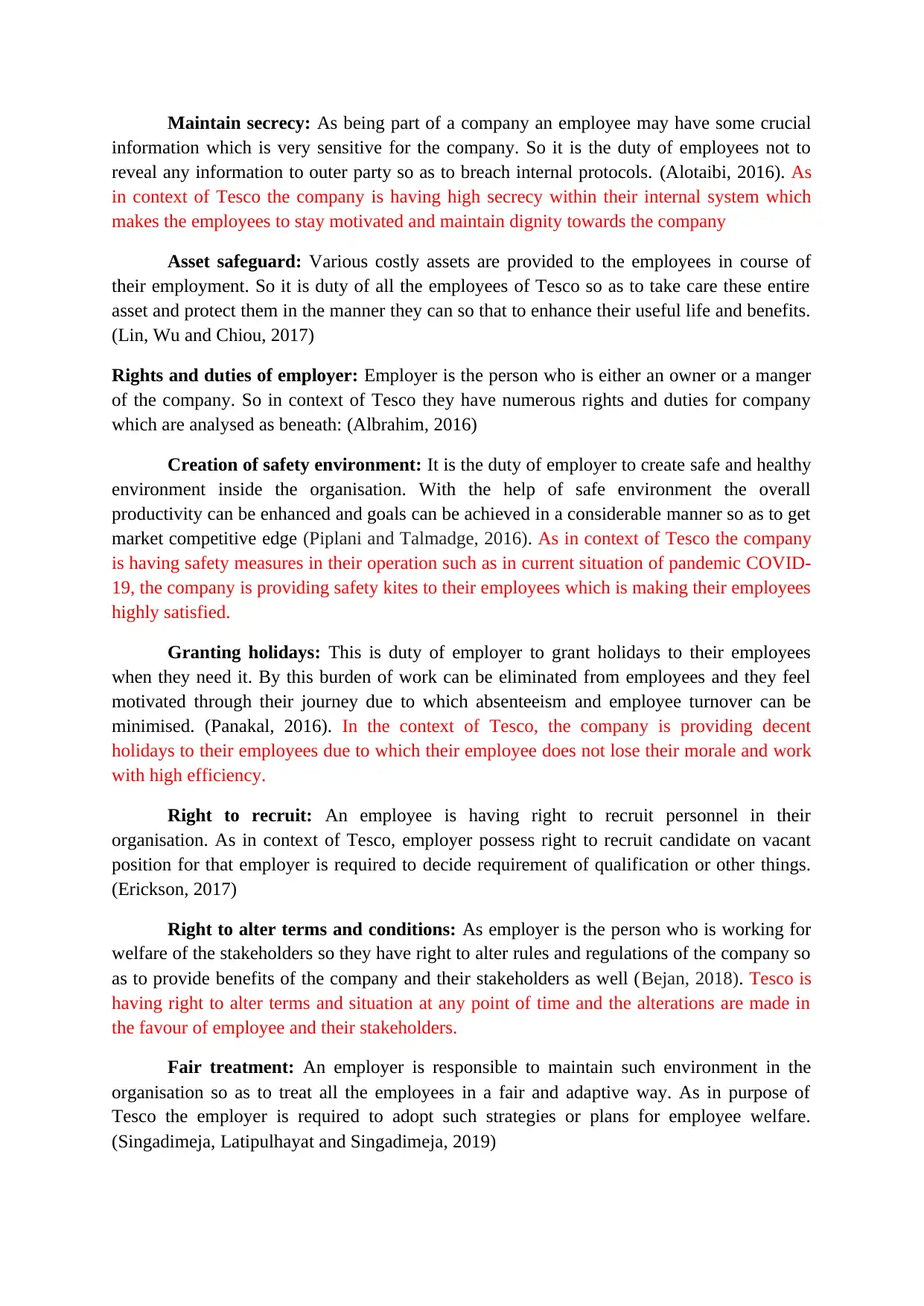
Maintain secrecy: As being part of a company an employee may have some crucial
information which is very sensitive for the company. So it is the duty of employees not to
reveal any information to outer party so as to breach internal protocols. (Alotaibi, 2016). As
in context of Tesco the company is having high secrecy within their internal system which
makes the employees to stay motivated and maintain dignity towards the company
Asset safeguard: Various costly assets are provided to the employees in course of
their employment. So it is duty of all the employees of Tesco so as to take care these entire
asset and protect them in the manner they can so that to enhance their useful life and benefits.
(Lin, Wu and Chiou, 2017)
Rights and duties of employer: Employer is the person who is either an owner or a manger
of the company. So in context of Tesco they have numerous rights and duties for company
which are analysed as beneath: (Albrahim, 2016)
Creation of safety environment: It is the duty of employer to create safe and healthy
environment inside the organisation. With the help of safe environment the overall
productivity can be enhanced and goals can be achieved in a considerable manner so as to get
market competitive edge (Piplani and Talmadge, 2016). As in context of Tesco the company
is having safety measures in their operation such as in current situation of pandemic COVID-
19, the company is providing safety kites to their employees which is making their employees
highly satisfied.
Granting holidays: This is duty of employer to grant holidays to their employees
when they need it. By this burden of work can be eliminated from employees and they feel
motivated through their journey due to which absenteeism and employee turnover can be
minimised. (Panakal, 2016). In the context of Tesco, the company is providing decent
holidays to their employees due to which their employee does not lose their morale and work
with high efficiency.
Right to recruit: An employee is having right to recruit personnel in their
organisation. As in context of Tesco, employer possess right to recruit candidate on vacant
position for that employer is required to decide requirement of qualification or other things.
(Erickson, 2017)
Right to alter terms and conditions: As employer is the person who is working for
welfare of the stakeholders so they have right to alter rules and regulations of the company so
as to provide benefits of the company and their stakeholders as well (Bejan, 2018). Tesco is
having right to alter terms and situation at any point of time and the alterations are made in
the favour of employee and their stakeholders.
Fair treatment: An employer is responsible to maintain such environment in the
organisation so as to treat all the employees in a fair and adaptive way. As in purpose of
Tesco the employer is required to adopt such strategies or plans for employee welfare.
(Singadimeja, Latipulhayat and Singadimeja, 2019)
information which is very sensitive for the company. So it is the duty of employees not to
reveal any information to outer party so as to breach internal protocols. (Alotaibi, 2016). As
in context of Tesco the company is having high secrecy within their internal system which
makes the employees to stay motivated and maintain dignity towards the company
Asset safeguard: Various costly assets are provided to the employees in course of
their employment. So it is duty of all the employees of Tesco so as to take care these entire
asset and protect them in the manner they can so that to enhance their useful life and benefits.
(Lin, Wu and Chiou, 2017)
Rights and duties of employer: Employer is the person who is either an owner or a manger
of the company. So in context of Tesco they have numerous rights and duties for company
which are analysed as beneath: (Albrahim, 2016)
Creation of safety environment: It is the duty of employer to create safe and healthy
environment inside the organisation. With the help of safe environment the overall
productivity can be enhanced and goals can be achieved in a considerable manner so as to get
market competitive edge (Piplani and Talmadge, 2016). As in context of Tesco the company
is having safety measures in their operation such as in current situation of pandemic COVID-
19, the company is providing safety kites to their employees which is making their employees
highly satisfied.
Granting holidays: This is duty of employer to grant holidays to their employees
when they need it. By this burden of work can be eliminated from employees and they feel
motivated through their journey due to which absenteeism and employee turnover can be
minimised. (Panakal, 2016). In the context of Tesco, the company is providing decent
holidays to their employees due to which their employee does not lose their morale and work
with high efficiency.
Right to recruit: An employee is having right to recruit personnel in their
organisation. As in context of Tesco, employer possess right to recruit candidate on vacant
position for that employer is required to decide requirement of qualification or other things.
(Erickson, 2017)
Right to alter terms and conditions: As employer is the person who is working for
welfare of the stakeholders so they have right to alter rules and regulations of the company so
as to provide benefits of the company and their stakeholders as well (Bejan, 2018). Tesco is
having right to alter terms and situation at any point of time and the alterations are made in
the favour of employee and their stakeholders.
Fair treatment: An employer is responsible to maintain such environment in the
organisation so as to treat all the employees in a fair and adaptive way. As in purpose of
Tesco the employer is required to adopt such strategies or plans for employee welfare.
(Singadimeja, Latipulhayat and Singadimeja, 2019)
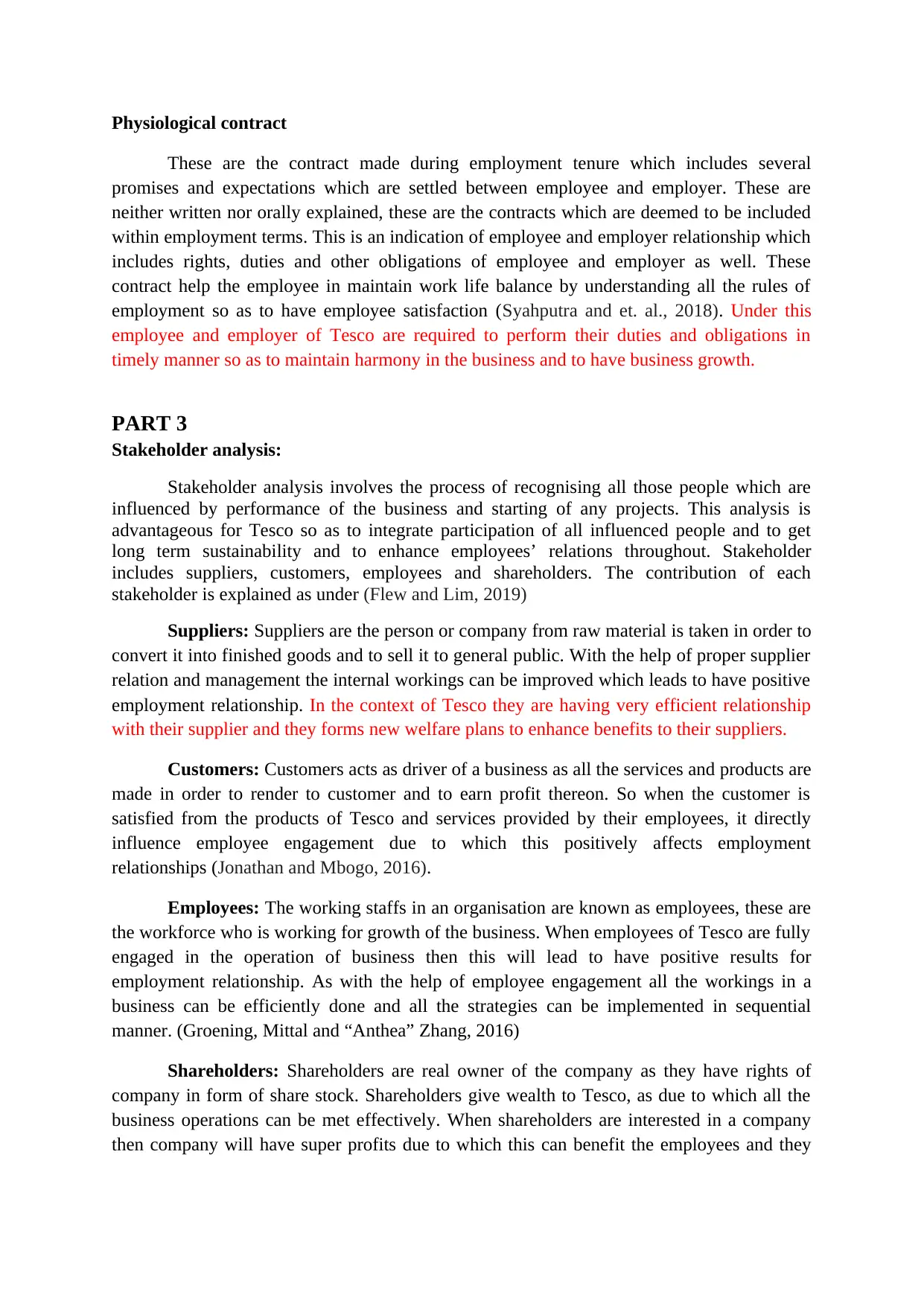
Physiological contract
These are the contract made during employment tenure which includes several
promises and expectations which are settled between employee and employer. These are
neither written nor orally explained, these are the contracts which are deemed to be included
within employment terms. This is an indication of employee and employer relationship which
includes rights, duties and other obligations of employee and employer as well. These
contract help the employee in maintain work life balance by understanding all the rules of
employment so as to have employee satisfaction (Syahputra and et. al., 2018). Under this
employee and employer of Tesco are required to perform their duties and obligations in
timely manner so as to maintain harmony in the business and to have business growth.
PART 3
Stakeholder analysis:
Stakeholder analysis involves the process of recognising all those people which are
influenced by performance of the business and starting of any projects. This analysis is
advantageous for Tesco so as to integrate participation of all influenced people and to get
long term sustainability and to enhance employees’ relations throughout. Stakeholder
includes suppliers, customers, employees and shareholders. The contribution of each
stakeholder is explained as under (Flew and Lim, 2019)
Suppliers: Suppliers are the person or company from raw material is taken in order to
convert it into finished goods and to sell it to general public. With the help of proper supplier
relation and management the internal workings can be improved which leads to have positive
employment relationship. In the context of Tesco they are having very efficient relationship
with their supplier and they forms new welfare plans to enhance benefits to their suppliers.
Customers: Customers acts as driver of a business as all the services and products are
made in order to render to customer and to earn profit thereon. So when the customer is
satisfied from the products of Tesco and services provided by their employees, it directly
influence employee engagement due to which this positively affects employment
relationships (Jonathan and Mbogo, 2016).
Employees: The working staffs in an organisation are known as employees, these are
the workforce who is working for growth of the business. When employees of Tesco are fully
engaged in the operation of business then this will lead to have positive results for
employment relationship. As with the help of employee engagement all the workings in a
business can be efficiently done and all the strategies can be implemented in sequential
manner. (Groening, Mittal and “Anthea” Zhang, 2016)
Shareholders: Shareholders are real owner of the company as they have rights of
company in form of share stock. Shareholders give wealth to Tesco, as due to which all the
business operations can be met effectively. When shareholders are interested in a company
then company will have super profits due to which this can benefit the employees and they
These are the contract made during employment tenure which includes several
promises and expectations which are settled between employee and employer. These are
neither written nor orally explained, these are the contracts which are deemed to be included
within employment terms. This is an indication of employee and employer relationship which
includes rights, duties and other obligations of employee and employer as well. These
contract help the employee in maintain work life balance by understanding all the rules of
employment so as to have employee satisfaction (Syahputra and et. al., 2018). Under this
employee and employer of Tesco are required to perform their duties and obligations in
timely manner so as to maintain harmony in the business and to have business growth.
PART 3
Stakeholder analysis:
Stakeholder analysis involves the process of recognising all those people which are
influenced by performance of the business and starting of any projects. This analysis is
advantageous for Tesco so as to integrate participation of all influenced people and to get
long term sustainability and to enhance employees’ relations throughout. Stakeholder
includes suppliers, customers, employees and shareholders. The contribution of each
stakeholder is explained as under (Flew and Lim, 2019)
Suppliers: Suppliers are the person or company from raw material is taken in order to
convert it into finished goods and to sell it to general public. With the help of proper supplier
relation and management the internal workings can be improved which leads to have positive
employment relationship. In the context of Tesco they are having very efficient relationship
with their supplier and they forms new welfare plans to enhance benefits to their suppliers.
Customers: Customers acts as driver of a business as all the services and products are
made in order to render to customer and to earn profit thereon. So when the customer is
satisfied from the products of Tesco and services provided by their employees, it directly
influence employee engagement due to which this positively affects employment
relationships (Jonathan and Mbogo, 2016).
Employees: The working staffs in an organisation are known as employees, these are
the workforce who is working for growth of the business. When employees of Tesco are fully
engaged in the operation of business then this will lead to have positive results for
employment relationship. As with the help of employee engagement all the workings in a
business can be efficiently done and all the strategies can be implemented in sequential
manner. (Groening, Mittal and “Anthea” Zhang, 2016)
Shareholders: Shareholders are real owner of the company as they have rights of
company in form of share stock. Shareholders give wealth to Tesco, as due to which all the
business operations can be met effectively. When shareholders are interested in a company
then company will have super profits due to which this can benefit the employees and they
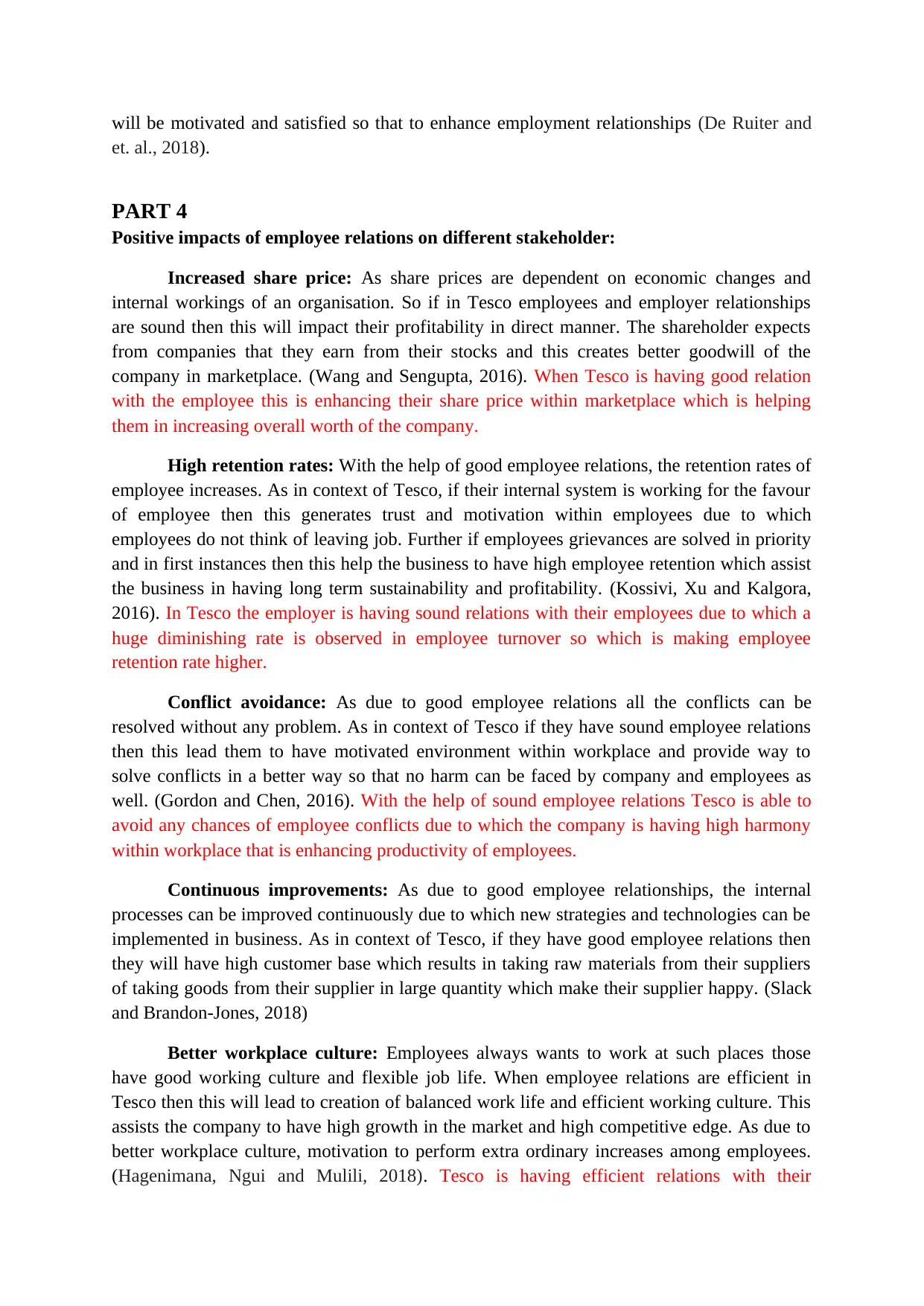
will be motivated and satisfied so that to enhance employment relationships (De Ruiter and
et. al., 2018).
PART 4
Positive impacts of employee relations on different stakeholder:
Increased share price: As share prices are dependent on economic changes and
internal workings of an organisation. So if in Tesco employees and employer relationships
are sound then this will impact their profitability in direct manner. The shareholder expects
from companies that they earn from their stocks and this creates better goodwill of the
company in marketplace. (Wang and Sengupta, 2016). When Tesco is having good relation
with the employee this is enhancing their share price within marketplace which is helping
them in increasing overall worth of the company.
High retention rates: With the help of good employee relations, the retention rates of
employee increases. As in context of Tesco, if their internal system is working for the favour
of employee then this generates trust and motivation within employees due to which
employees do not think of leaving job. Further if employees grievances are solved in priority
and in first instances then this help the business to have high employee retention which assist
the business in having long term sustainability and profitability. (Kossivi, Xu and Kalgora,
2016). In Tesco the employer is having sound relations with their employees due to which a
huge diminishing rate is observed in employee turnover so which is making employee
retention rate higher.
Conflict avoidance: As due to good employee relations all the conflicts can be
resolved without any problem. As in context of Tesco if they have sound employee relations
then this lead them to have motivated environment within workplace and provide way to
solve conflicts in a better way so that no harm can be faced by company and employees as
well. (Gordon and Chen, 2016). With the help of sound employee relations Tesco is able to
avoid any chances of employee conflicts due to which the company is having high harmony
within workplace that is enhancing productivity of employees.
Continuous improvements: As due to good employee relationships, the internal
processes can be improved continuously due to which new strategies and technologies can be
implemented in business. As in context of Tesco, if they have good employee relations then
they will have high customer base which results in taking raw materials from their suppliers
of taking goods from their supplier in large quantity which make their supplier happy. (Slack
and Brandon-Jones, 2018)
Better workplace culture: Employees always wants to work at such places those
have good working culture and flexible job life. When employee relations are efficient in
Tesco then this will lead to creation of balanced work life and efficient working culture. This
assists the company to have high growth in the market and high competitive edge. As due to
better workplace culture, motivation to perform extra ordinary increases among employees.
(Hagenimana, Ngui and Mulili, 2018). Tesco is having efficient relations with their
et. al., 2018).
PART 4
Positive impacts of employee relations on different stakeholder:
Increased share price: As share prices are dependent on economic changes and
internal workings of an organisation. So if in Tesco employees and employer relationships
are sound then this will impact their profitability in direct manner. The shareholder expects
from companies that they earn from their stocks and this creates better goodwill of the
company in marketplace. (Wang and Sengupta, 2016). When Tesco is having good relation
with the employee this is enhancing their share price within marketplace which is helping
them in increasing overall worth of the company.
High retention rates: With the help of good employee relations, the retention rates of
employee increases. As in context of Tesco, if their internal system is working for the favour
of employee then this generates trust and motivation within employees due to which
employees do not think of leaving job. Further if employees grievances are solved in priority
and in first instances then this help the business to have high employee retention which assist
the business in having long term sustainability and profitability. (Kossivi, Xu and Kalgora,
2016). In Tesco the employer is having sound relations with their employees due to which a
huge diminishing rate is observed in employee turnover so which is making employee
retention rate higher.
Conflict avoidance: As due to good employee relations all the conflicts can be
resolved without any problem. As in context of Tesco if they have sound employee relations
then this lead them to have motivated environment within workplace and provide way to
solve conflicts in a better way so that no harm can be faced by company and employees as
well. (Gordon and Chen, 2016). With the help of sound employee relations Tesco is able to
avoid any chances of employee conflicts due to which the company is having high harmony
within workplace that is enhancing productivity of employees.
Continuous improvements: As due to good employee relationships, the internal
processes can be improved continuously due to which new strategies and technologies can be
implemented in business. As in context of Tesco, if they have good employee relations then
they will have high customer base which results in taking raw materials from their suppliers
of taking goods from their supplier in large quantity which make their supplier happy. (Slack
and Brandon-Jones, 2018)
Better workplace culture: Employees always wants to work at such places those
have good working culture and flexible job life. When employee relations are efficient in
Tesco then this will lead to creation of balanced work life and efficient working culture. This
assists the company to have high growth in the market and high competitive edge. As due to
better workplace culture, motivation to perform extra ordinary increases among employees.
(Hagenimana, Ngui and Mulili, 2018). Tesco is having efficient relations with their
Paraphrase This Document
Need a fresh take? Get an instant paraphrase of this document with our AI Paraphraser
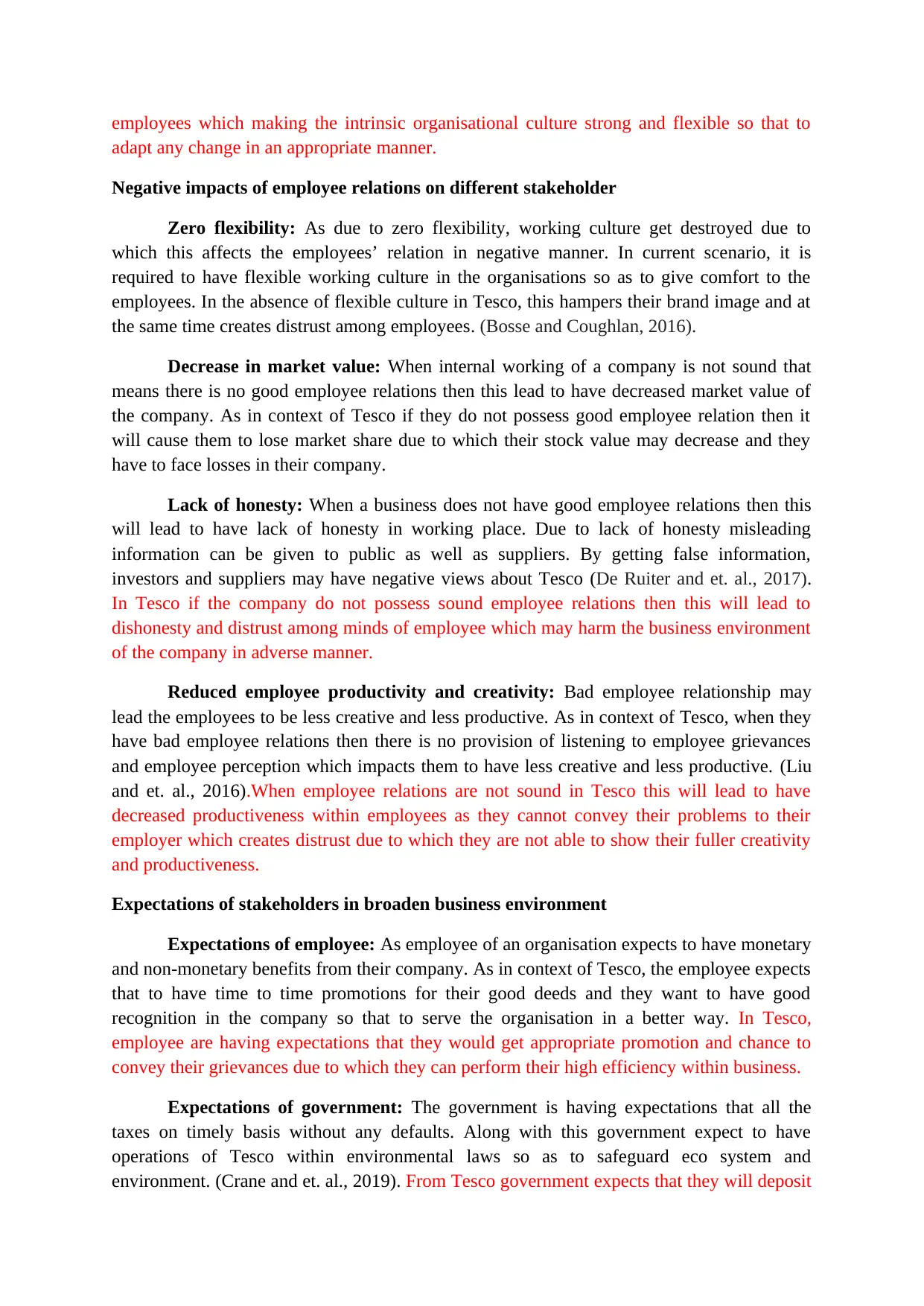
employees which making the intrinsic organisational culture strong and flexible so that to
adapt any change in an appropriate manner.
Negative impacts of employee relations on different stakeholder
Zero flexibility: As due to zero flexibility, working culture get destroyed due to
which this affects the employees’ relation in negative manner. In current scenario, it is
required to have flexible working culture in the organisations so as to give comfort to the
employees. In the absence of flexible culture in Tesco, this hampers their brand image and at
the same time creates distrust among employees. (Bosse and Coughlan, 2016).
Decrease in market value: When internal working of a company is not sound that
means there is no good employee relations then this lead to have decreased market value of
the company. As in context of Tesco if they do not possess good employee relation then it
will cause them to lose market share due to which their stock value may decrease and they
have to face losses in their company.
Lack of honesty: When a business does not have good employee relations then this
will lead to have lack of honesty in working place. Due to lack of honesty misleading
information can be given to public as well as suppliers. By getting false information,
investors and suppliers may have negative views about Tesco (De Ruiter and et. al., 2017).
In Tesco if the company do not possess sound employee relations then this will lead to
dishonesty and distrust among minds of employee which may harm the business environment
of the company in adverse manner.
Reduced employee productivity and creativity: Bad employee relationship may
lead the employees to be less creative and less productive. As in context of Tesco, when they
have bad employee relations then there is no provision of listening to employee grievances
and employee perception which impacts them to have less creative and less productive. (Liu
and et. al., 2016).When employee relations are not sound in Tesco this will lead to have
decreased productiveness within employees as they cannot convey their problems to their
employer which creates distrust due to which they are not able to show their fuller creativity
and productiveness.
Expectations of stakeholders in broaden business environment
Expectations of employee: As employee of an organisation expects to have monetary
and non-monetary benefits from their company. As in context of Tesco, the employee expects
that to have time to time promotions for their good deeds and they want to have good
recognition in the company so that to serve the organisation in a better way. In Tesco,
employee are having expectations that they would get appropriate promotion and chance to
convey their grievances due to which they can perform their high efficiency within business.
Expectations of government: The government is having expectations that all the
taxes on timely basis without any defaults. Along with this government expect to have
operations of Tesco within environmental laws so as to safeguard eco system and
environment. (Crane and et. al., 2019). From Tesco government expects that they will deposit
adapt any change in an appropriate manner.
Negative impacts of employee relations on different stakeholder
Zero flexibility: As due to zero flexibility, working culture get destroyed due to
which this affects the employees’ relation in negative manner. In current scenario, it is
required to have flexible working culture in the organisations so as to give comfort to the
employees. In the absence of flexible culture in Tesco, this hampers their brand image and at
the same time creates distrust among employees. (Bosse and Coughlan, 2016).
Decrease in market value: When internal working of a company is not sound that
means there is no good employee relations then this lead to have decreased market value of
the company. As in context of Tesco if they do not possess good employee relation then it
will cause them to lose market share due to which their stock value may decrease and they
have to face losses in their company.
Lack of honesty: When a business does not have good employee relations then this
will lead to have lack of honesty in working place. Due to lack of honesty misleading
information can be given to public as well as suppliers. By getting false information,
investors and suppliers may have negative views about Tesco (De Ruiter and et. al., 2017).
In Tesco if the company do not possess sound employee relations then this will lead to
dishonesty and distrust among minds of employee which may harm the business environment
of the company in adverse manner.
Reduced employee productivity and creativity: Bad employee relationship may
lead the employees to be less creative and less productive. As in context of Tesco, when they
have bad employee relations then there is no provision of listening to employee grievances
and employee perception which impacts them to have less creative and less productive. (Liu
and et. al., 2016).When employee relations are not sound in Tesco this will lead to have
decreased productiveness within employees as they cannot convey their problems to their
employer which creates distrust due to which they are not able to show their fuller creativity
and productiveness.
Expectations of stakeholders in broaden business environment
Expectations of employee: As employee of an organisation expects to have monetary
and non-monetary benefits from their company. As in context of Tesco, the employee expects
that to have time to time promotions for their good deeds and they want to have good
recognition in the company so that to serve the organisation in a better way. In Tesco,
employee are having expectations that they would get appropriate promotion and chance to
convey their grievances due to which they can perform their high efficiency within business.
Expectations of government: The government is having expectations that all the
taxes on timely basis without any defaults. Along with this government expect to have
operations of Tesco within environmental laws so as to safeguard eco system and
environment. (Crane and et. al., 2019). From Tesco government expects that they will deposit
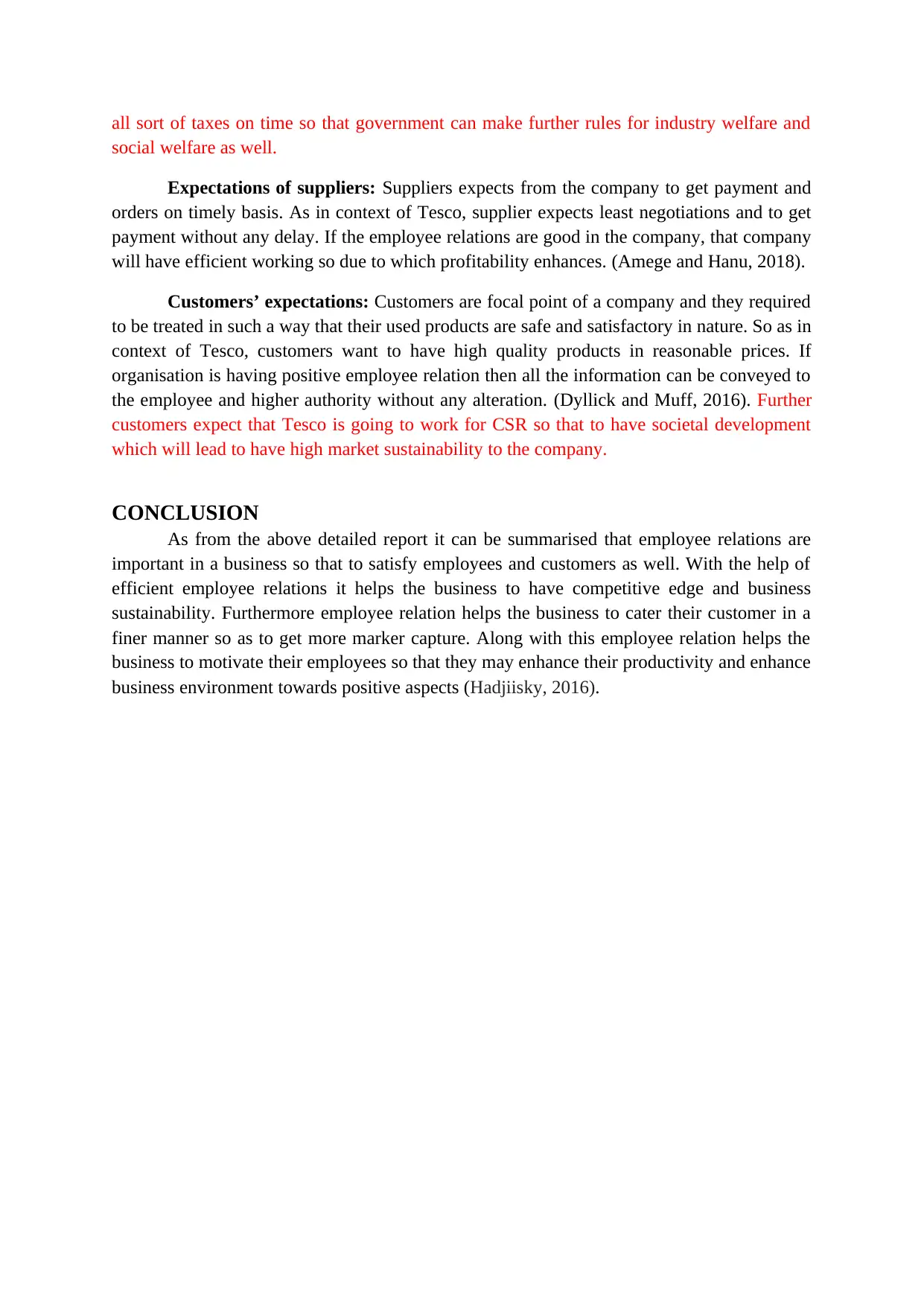
all sort of taxes on time so that government can make further rules for industry welfare and
social welfare as well.
Expectations of suppliers: Suppliers expects from the company to get payment and
orders on timely basis. As in context of Tesco, supplier expects least negotiations and to get
payment without any delay. If the employee relations are good in the company, that company
will have efficient working so due to which profitability enhances. (Amege and Hanu, 2018).
Customers’ expectations: Customers are focal point of a company and they required
to be treated in such a way that their used products are safe and satisfactory in nature. So as in
context of Tesco, customers want to have high quality products in reasonable prices. If
organisation is having positive employee relation then all the information can be conveyed to
the employee and higher authority without any alteration. (Dyllick and Muff, 2016). Further
customers expect that Tesco is going to work for CSR so that to have societal development
which will lead to have high market sustainability to the company.
CONCLUSION
As from the above detailed report it can be summarised that employee relations are
important in a business so that to satisfy employees and customers as well. With the help of
efficient employee relations it helps the business to have competitive edge and business
sustainability. Furthermore employee relation helps the business to cater their customer in a
finer manner so as to get more marker capture. Along with this employee relation helps the
business to motivate their employees so that they may enhance their productivity and enhance
business environment towards positive aspects (Hadjiisky, 2016).
social welfare as well.
Expectations of suppliers: Suppliers expects from the company to get payment and
orders on timely basis. As in context of Tesco, supplier expects least negotiations and to get
payment without any delay. If the employee relations are good in the company, that company
will have efficient working so due to which profitability enhances. (Amege and Hanu, 2018).
Customers’ expectations: Customers are focal point of a company and they required
to be treated in such a way that their used products are safe and satisfactory in nature. So as in
context of Tesco, customers want to have high quality products in reasonable prices. If
organisation is having positive employee relation then all the information can be conveyed to
the employee and higher authority without any alteration. (Dyllick and Muff, 2016). Further
customers expect that Tesco is going to work for CSR so that to have societal development
which will lead to have high market sustainability to the company.
CONCLUSION
As from the above detailed report it can be summarised that employee relations are
important in a business so that to satisfy employees and customers as well. With the help of
efficient employee relations it helps the business to have competitive edge and business
sustainability. Furthermore employee relation helps the business to cater their customer in a
finer manner so as to get more marker capture. Along with this employee relation helps the
business to motivate their employees so that they may enhance their productivity and enhance
business environment towards positive aspects (Hadjiisky, 2016).
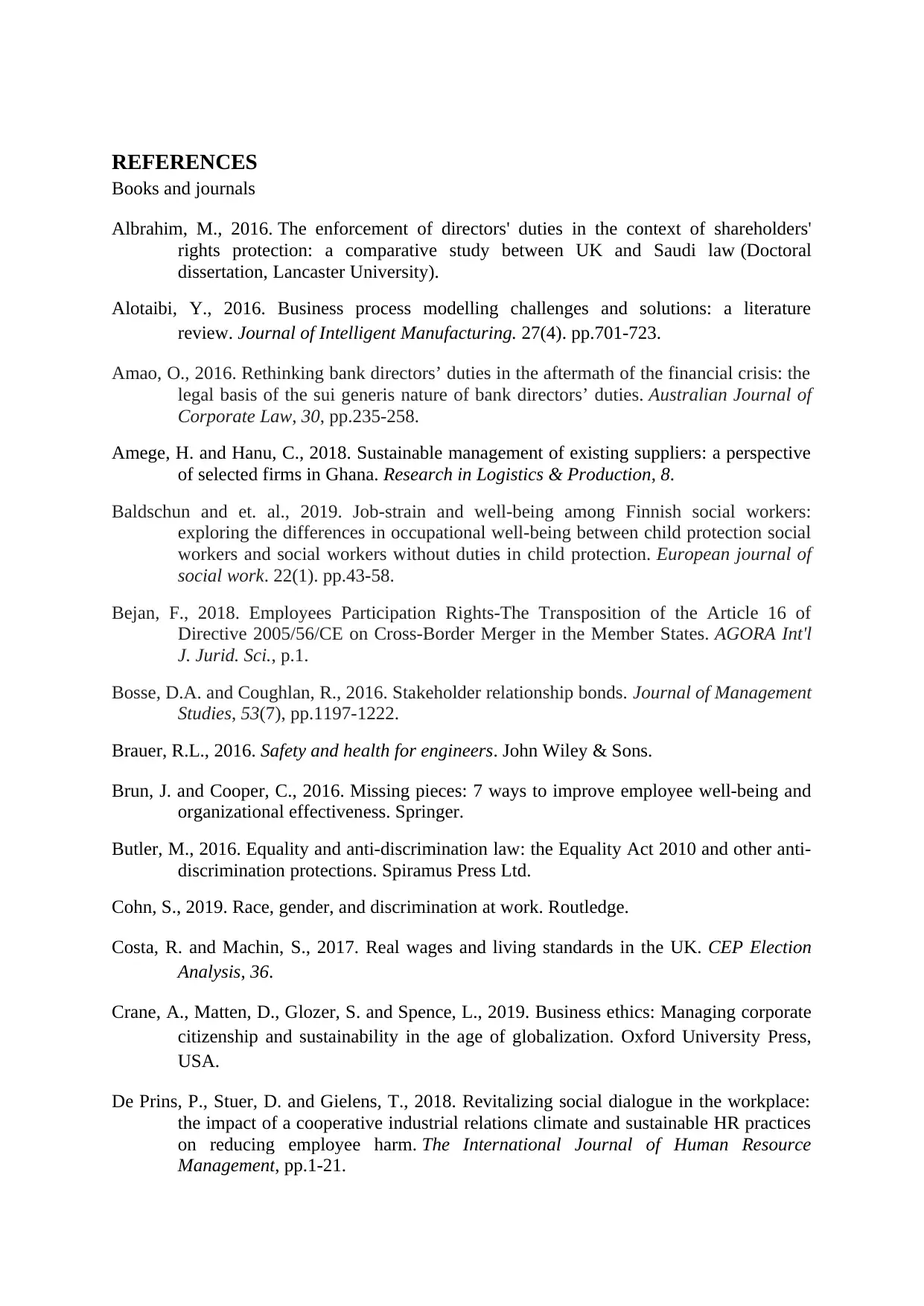
REFERENCES
Books and journals
Albrahim, M., 2016. The enforcement of directors' duties in the context of shareholders'
rights protection: a comparative study between UK and Saudi law (Doctoral
dissertation, Lancaster University).
Alotaibi, Y., 2016. Business process modelling challenges and solutions: a literature
review. Journal of Intelligent Manufacturing. 27(4). pp.701-723.
Amao, O., 2016. Rethinking bank directors’ duties in the aftermath of the financial crisis: the
legal basis of the sui generis nature of bank directors’ duties. Australian Journal of
Corporate Law, 30, pp.235-258.
Amege, H. and Hanu, C., 2018. Sustainable management of existing suppliers: a perspective
of selected firms in Ghana. Research in Logistics & Production, 8.
Baldschun and et. al., 2019. Job-strain and well-being among Finnish social workers:
exploring the differences in occupational well-being between child protection social
workers and social workers without duties in child protection. European journal of
social work. 22(1). pp.43-58.
Bejan, F., 2018. Employees Participation Rights-The Transposition of the Article 16 of
Directive 2005/56/CE on Cross-Border Merger in the Member States. AGORA Int'l
J. Jurid. Sci., p.1.
Bosse, D.A. and Coughlan, R., 2016. Stakeholder relationship bonds. Journal of Management
Studies, 53(7), pp.1197-1222.
Brauer, R.L., 2016. Safety and health for engineers. John Wiley & Sons.
Brun, J. and Cooper, C., 2016. Missing pieces: 7 ways to improve employee well-being and
organizational effectiveness. Springer.
Butler, M., 2016. Equality and anti-discrimination law: the Equality Act 2010 and other anti-
discrimination protections. Spiramus Press Ltd.
Cohn, S., 2019. Race, gender, and discrimination at work. Routledge.
Costa, R. and Machin, S., 2017. Real wages and living standards in the UK. CEP Election
Analysis, 36.
Crane, A., Matten, D., Glozer, S. and Spence, L., 2019. Business ethics: Managing corporate
citizenship and sustainability in the age of globalization. Oxford University Press,
USA.
De Prins, P., Stuer, D. and Gielens, T., 2018. Revitalizing social dialogue in the workplace:
the impact of a cooperative industrial relations climate and sustainable HR practices
on reducing employee harm. The International Journal of Human Resource
Management, pp.1-21.
Books and journals
Albrahim, M., 2016. The enforcement of directors' duties in the context of shareholders'
rights protection: a comparative study between UK and Saudi law (Doctoral
dissertation, Lancaster University).
Alotaibi, Y., 2016. Business process modelling challenges and solutions: a literature
review. Journal of Intelligent Manufacturing. 27(4). pp.701-723.
Amao, O., 2016. Rethinking bank directors’ duties in the aftermath of the financial crisis: the
legal basis of the sui generis nature of bank directors’ duties. Australian Journal of
Corporate Law, 30, pp.235-258.
Amege, H. and Hanu, C., 2018. Sustainable management of existing suppliers: a perspective
of selected firms in Ghana. Research in Logistics & Production, 8.
Baldschun and et. al., 2019. Job-strain and well-being among Finnish social workers:
exploring the differences in occupational well-being between child protection social
workers and social workers without duties in child protection. European journal of
social work. 22(1). pp.43-58.
Bejan, F., 2018. Employees Participation Rights-The Transposition of the Article 16 of
Directive 2005/56/CE on Cross-Border Merger in the Member States. AGORA Int'l
J. Jurid. Sci., p.1.
Bosse, D.A. and Coughlan, R., 2016. Stakeholder relationship bonds. Journal of Management
Studies, 53(7), pp.1197-1222.
Brauer, R.L., 2016. Safety and health for engineers. John Wiley & Sons.
Brun, J. and Cooper, C., 2016. Missing pieces: 7 ways to improve employee well-being and
organizational effectiveness. Springer.
Butler, M., 2016. Equality and anti-discrimination law: the Equality Act 2010 and other anti-
discrimination protections. Spiramus Press Ltd.
Cohn, S., 2019. Race, gender, and discrimination at work. Routledge.
Costa, R. and Machin, S., 2017. Real wages and living standards in the UK. CEP Election
Analysis, 36.
Crane, A., Matten, D., Glozer, S. and Spence, L., 2019. Business ethics: Managing corporate
citizenship and sustainability in the age of globalization. Oxford University Press,
USA.
De Prins, P., Stuer, D. and Gielens, T., 2018. Revitalizing social dialogue in the workplace:
the impact of a cooperative industrial relations climate and sustainable HR practices
on reducing employee harm. The International Journal of Human Resource
Management, pp.1-21.
Secure Best Marks with AI Grader
Need help grading? Try our AI Grader for instant feedback on your assignments.
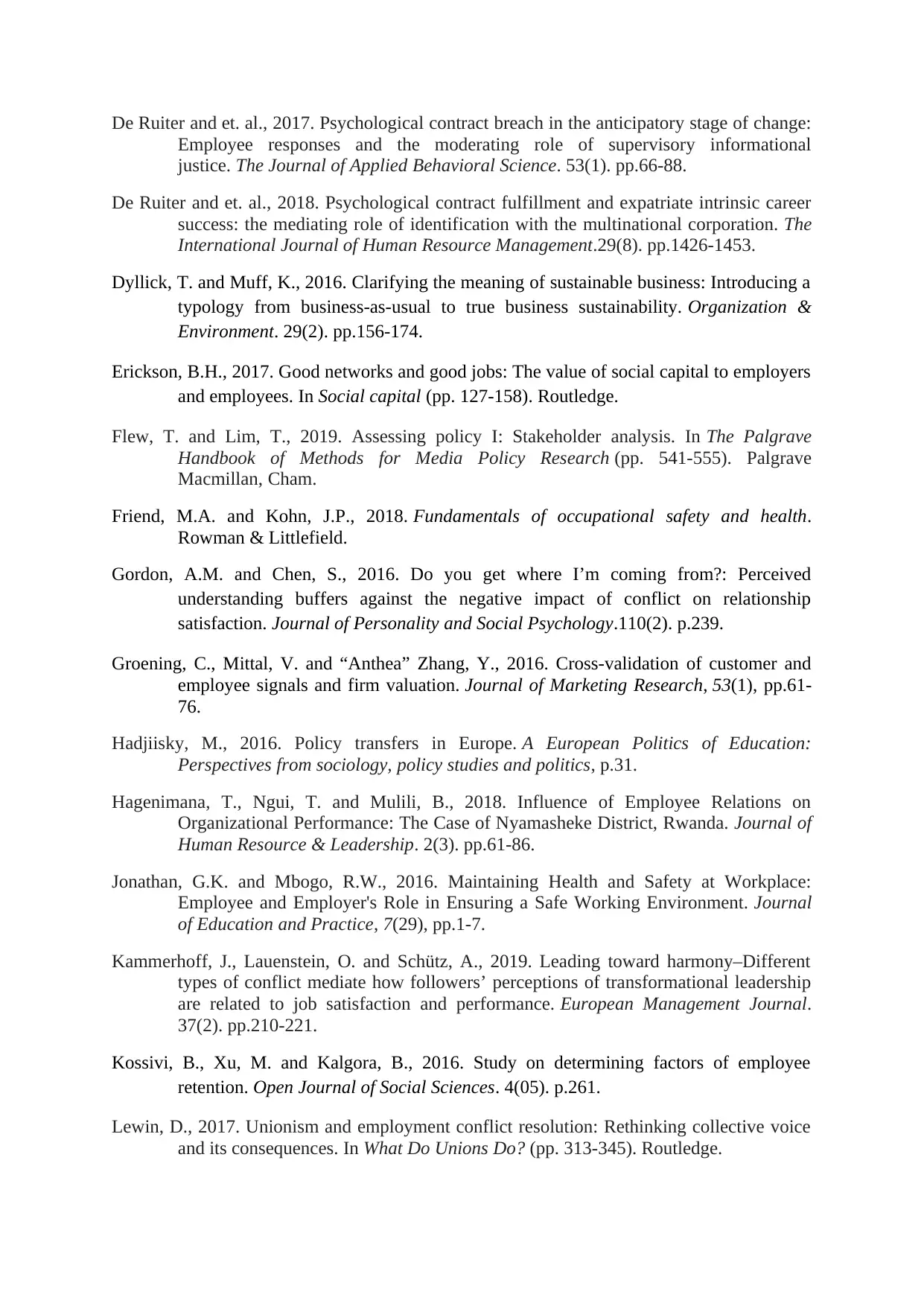
De Ruiter and et. al., 2017. Psychological contract breach in the anticipatory stage of change:
Employee responses and the moderating role of supervisory informational
justice. The Journal of Applied Behavioral Science. 53(1). pp.66-88.
De Ruiter and et. al., 2018. Psychological contract fulfillment and expatriate intrinsic career
success: the mediating role of identification with the multinational corporation. The
International Journal of Human Resource Management.29(8). pp.1426-1453.
Dyllick, T. and Muff, K., 2016. Clarifying the meaning of sustainable business: Introducing a
typology from business-as-usual to true business sustainability. Organization &
Environment. 29(2). pp.156-174.
Erickson, B.H., 2017. Good networks and good jobs: The value of social capital to employers
and employees. In Social capital (pp. 127-158). Routledge.
Flew, T. and Lim, T., 2019. Assessing policy I: Stakeholder analysis. In The Palgrave
Handbook of Methods for Media Policy Research (pp. 541-555). Palgrave
Macmillan, Cham.
Friend, M.A. and Kohn, J.P., 2018. Fundamentals of occupational safety and health.
Rowman & Littlefield.
Gordon, A.M. and Chen, S., 2016. Do you get where I’m coming from?: Perceived
understanding buffers against the negative impact of conflict on relationship
satisfaction. Journal of Personality and Social Psychology.110(2). p.239.
Groening, C., Mittal, V. and “Anthea” Zhang, Y., 2016. Cross-validation of customer and
employee signals and firm valuation. Journal of Marketing Research, 53(1), pp.61-
76.
Hadjiisky, M., 2016. Policy transfers in Europe. A European Politics of Education:
Perspectives from sociology, policy studies and politics, p.31.
Hagenimana, T., Ngui, T. and Mulili, B., 2018. Influence of Employee Relations on
Organizational Performance: The Case of Nyamasheke District, Rwanda. Journal of
Human Resource & Leadership. 2(3). pp.61-86.
Jonathan, G.K. and Mbogo, R.W., 2016. Maintaining Health and Safety at Workplace:
Employee and Employer's Role in Ensuring a Safe Working Environment. Journal
of Education and Practice, 7(29), pp.1-7.
Kammerhoff, J., Lauenstein, O. and Schütz, A., 2019. Leading toward harmony–Different
types of conflict mediate how followers’ perceptions of transformational leadership
are related to job satisfaction and performance. European Management Journal.
37(2). pp.210-221.
Kossivi, B., Xu, M. and Kalgora, B., 2016. Study on determining factors of employee
retention. Open Journal of Social Sciences. 4(05). p.261.
Lewin, D., 2017. Unionism and employment conflict resolution: Rethinking collective voice
and its consequences. In What Do Unions Do? (pp. 313-345). Routledge.
Employee responses and the moderating role of supervisory informational
justice. The Journal of Applied Behavioral Science. 53(1). pp.66-88.
De Ruiter and et. al., 2018. Psychological contract fulfillment and expatriate intrinsic career
success: the mediating role of identification with the multinational corporation. The
International Journal of Human Resource Management.29(8). pp.1426-1453.
Dyllick, T. and Muff, K., 2016. Clarifying the meaning of sustainable business: Introducing a
typology from business-as-usual to true business sustainability. Organization &
Environment. 29(2). pp.156-174.
Erickson, B.H., 2017. Good networks and good jobs: The value of social capital to employers
and employees. In Social capital (pp. 127-158). Routledge.
Flew, T. and Lim, T., 2019. Assessing policy I: Stakeholder analysis. In The Palgrave
Handbook of Methods for Media Policy Research (pp. 541-555). Palgrave
Macmillan, Cham.
Friend, M.A. and Kohn, J.P., 2018. Fundamentals of occupational safety and health.
Rowman & Littlefield.
Gordon, A.M. and Chen, S., 2016. Do you get where I’m coming from?: Perceived
understanding buffers against the negative impact of conflict on relationship
satisfaction. Journal of Personality and Social Psychology.110(2). p.239.
Groening, C., Mittal, V. and “Anthea” Zhang, Y., 2016. Cross-validation of customer and
employee signals and firm valuation. Journal of Marketing Research, 53(1), pp.61-
76.
Hadjiisky, M., 2016. Policy transfers in Europe. A European Politics of Education:
Perspectives from sociology, policy studies and politics, p.31.
Hagenimana, T., Ngui, T. and Mulili, B., 2018. Influence of Employee Relations on
Organizational Performance: The Case of Nyamasheke District, Rwanda. Journal of
Human Resource & Leadership. 2(3). pp.61-86.
Jonathan, G.K. and Mbogo, R.W., 2016. Maintaining Health and Safety at Workplace:
Employee and Employer's Role in Ensuring a Safe Working Environment. Journal
of Education and Practice, 7(29), pp.1-7.
Kammerhoff, J., Lauenstein, O. and Schütz, A., 2019. Leading toward harmony–Different
types of conflict mediate how followers’ perceptions of transformational leadership
are related to job satisfaction and performance. European Management Journal.
37(2). pp.210-221.
Kossivi, B., Xu, M. and Kalgora, B., 2016. Study on determining factors of employee
retention. Open Journal of Social Sciences. 4(05). p.261.
Lewin, D., 2017. Unionism and employment conflict resolution: Rethinking collective voice
and its consequences. In What Do Unions Do? (pp. 313-345). Routledge.
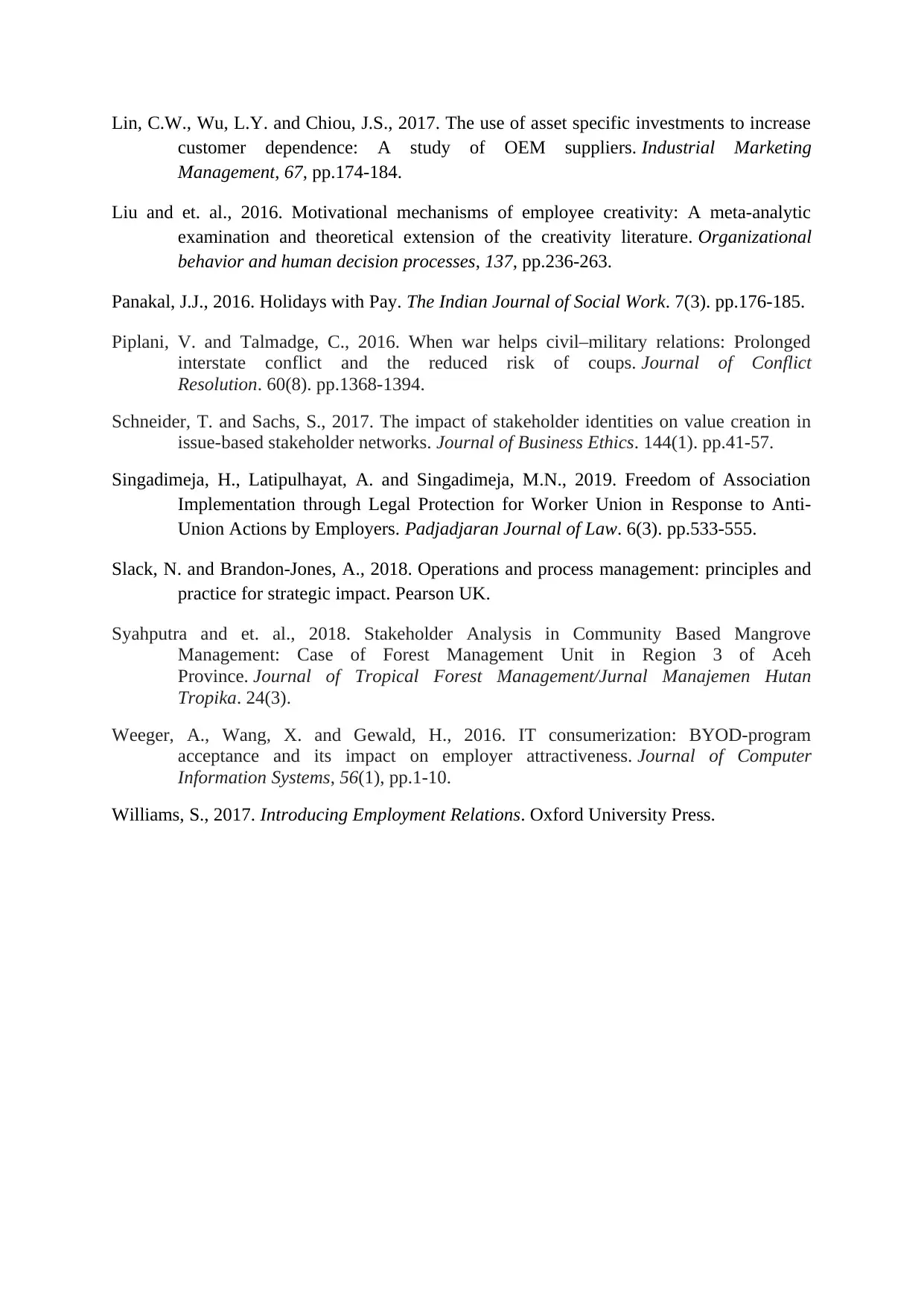
Lin, C.W., Wu, L.Y. and Chiou, J.S., 2017. The use of asset specific investments to increase
customer dependence: A study of OEM suppliers. Industrial Marketing
Management, 67, pp.174-184.
Liu and et. al., 2016. Motivational mechanisms of employee creativity: A meta-analytic
examination and theoretical extension of the creativity literature. Organizational
behavior and human decision processes, 137, pp.236-263.
Panakal, J.J., 2016. Holidays with Pay. The Indian Journal of Social Work. 7(3). pp.176-185.
Piplani, V. and Talmadge, C., 2016. When war helps civil–military relations: Prolonged
interstate conflict and the reduced risk of coups. Journal of Conflict
Resolution. 60(8). pp.1368-1394.
Schneider, T. and Sachs, S., 2017. The impact of stakeholder identities on value creation in
issue-based stakeholder networks. Journal of Business Ethics. 144(1). pp.41-57.
Singadimeja, H., Latipulhayat, A. and Singadimeja, M.N., 2019. Freedom of Association
Implementation through Legal Protection for Worker Union in Response to Anti-
Union Actions by Employers. Padjadjaran Journal of Law. 6(3). pp.533-555.
Slack, N. and Brandon-Jones, A., 2018. Operations and process management: principles and
practice for strategic impact. Pearson UK.
Syahputra and et. al., 2018. Stakeholder Analysis in Community Based Mangrove
Management: Case of Forest Management Unit in Region 3 of Aceh
Province. Journal of Tropical Forest Management/Jurnal Manajemen Hutan
Tropika. 24(3).
Weeger, A., Wang, X. and Gewald, H., 2016. IT consumerization: BYOD-program
acceptance and its impact on employer attractiveness. Journal of Computer
Information Systems, 56(1), pp.1-10.
Williams, S., 2017. Introducing Employment Relations. Oxford University Press.
customer dependence: A study of OEM suppliers. Industrial Marketing
Management, 67, pp.174-184.
Liu and et. al., 2016. Motivational mechanisms of employee creativity: A meta-analytic
examination and theoretical extension of the creativity literature. Organizational
behavior and human decision processes, 137, pp.236-263.
Panakal, J.J., 2016. Holidays with Pay. The Indian Journal of Social Work. 7(3). pp.176-185.
Piplani, V. and Talmadge, C., 2016. When war helps civil–military relations: Prolonged
interstate conflict and the reduced risk of coups. Journal of Conflict
Resolution. 60(8). pp.1368-1394.
Schneider, T. and Sachs, S., 2017. The impact of stakeholder identities on value creation in
issue-based stakeholder networks. Journal of Business Ethics. 144(1). pp.41-57.
Singadimeja, H., Latipulhayat, A. and Singadimeja, M.N., 2019. Freedom of Association
Implementation through Legal Protection for Worker Union in Response to Anti-
Union Actions by Employers. Padjadjaran Journal of Law. 6(3). pp.533-555.
Slack, N. and Brandon-Jones, A., 2018. Operations and process management: principles and
practice for strategic impact. Pearson UK.
Syahputra and et. al., 2018. Stakeholder Analysis in Community Based Mangrove
Management: Case of Forest Management Unit in Region 3 of Aceh
Province. Journal of Tropical Forest Management/Jurnal Manajemen Hutan
Tropika. 24(3).
Weeger, A., Wang, X. and Gewald, H., 2016. IT consumerization: BYOD-program
acceptance and its impact on employer attractiveness. Journal of Computer
Information Systems, 56(1), pp.1-10.
Williams, S., 2017. Introducing Employment Relations. Oxford University Press.
1 out of 12
Related Documents
Your All-in-One AI-Powered Toolkit for Academic Success.
+13062052269
info@desklib.com
Available 24*7 on WhatsApp / Email
![[object Object]](/_next/static/media/star-bottom.7253800d.svg)
Unlock your academic potential
© 2024 | Zucol Services PVT LTD | All rights reserved.




